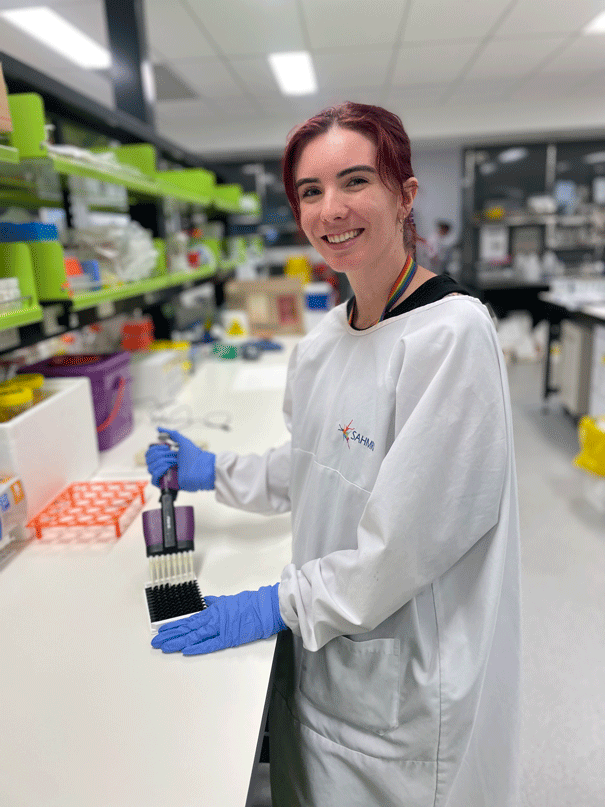"Our ultimate goal is to discover new molecular markers of disease risk and to design drugs that target novel therapeutic pathways."
Kate Vandyke, PhD
Head, Myeloma Research Laboratory
School of Biomedicine, Faculty of Health and Medical Sciences, The University of Adelaide

Key Projects

The Myeloma Research Laboratory
Based at the South Australian Health and Medical Research Institute (SAHMRI) and the University of Adelaide, the Myeloma Research Laboratory is led by Dr Kate Vandyke and comprises a team of over 20 students and staff. Together, we are dedicated to studying the molecular and cellular basis for the development of multiple myeloma, the second most common blood cancer world-wide. Myeloma is characterised by the clonal proliferation of malignant plasma cells, cells that normally play a key role in immune defence. Every year, over 150,000 people are diagnosed with this disease globally. Despite recent advances in treatment, myeloma remains incurable.
Using state-of-the art genomics, in vitro models of cancer development, and preclinical models of disease, the Myeloma Research Laboratory is focused on identifying the key genes that are responsible for myeloma development and determining the role played by the bone marrow microenvironment in disease development and relapse.
Our ultimate goal is to discover new molecular markers of disease risk and to design drugs that target novel therapeutic pathways.

Scholarship recipient Laura Trainor, who is currently in her final year on the single-cell RNA sequencing project.
Using single cell RNA sequencing to understand the role of the bone marrow microenvironment in multiple myeloma progression
Research Update
This project uses single-cell RNA sequencing to investigate how normal bone marrow cells—the "bone marrow microenvironment"—influence the development and growth of multiple myeloma. For the first time, bone marrow biopsies from myeloma patients have been analysed using this advanced technique to map the cellular landscape comprehensively.
Our research has revealed that bone marrow fat cells, or adipocytes, play a previously underestimated role in supporting myeloma tumour growth. We have identified several genes that are abnormally activated in adipocytes within the bone marrow of myeloma patients. Current studies are focused on testing whether these genes drive myeloma cell growth and, if so, whether they can serve as targets for new therapies.
Using cutting-edge multiomic approaches to identify clinically relevant tumour vulnerabilities in multiple myeloma
Research Update
Multiple myeloma remains largely incurable, as patients inevitably experience therapy resistance and disease relapse. To improve outcomes, we urgently need to identify novel pathways that contribute to myeloma development, disease progression and drug resistance and relapse.
Our data suggest that the growth of myeloma tumour cells is critically dependent on the expression of genes from several specific metabolic pathways, suggesting that adaptive changes in myeloma cell metabolism plays a critical role in tumour growth. In this project, CRISPR gRNA screens and metabolomics will be used to dissect the metabolic dependencies of myeloma tumours, using both patient-derived samples and cutting-edge mouse models. By pinpointing the critical metabolic pathways that fuel tumour growth, we aim to identify new therapeutic targets that could revolutionise myeloma treatment.
